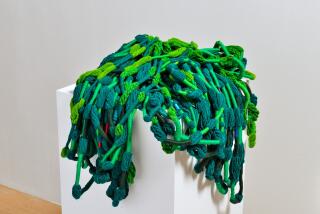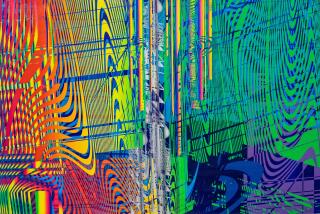Since the 9th Century, Tibetan artisans have...
- Share via
Since the 9th Century, Tibetan artisans have woven fine rugs from the hair fibers of sheep, goats and the ubiquitous yak.
The intricately woven works are not only for the rich in Tibet--they are found in monasteries and temples, and in the homes of the poor as well.
This month, a rare exhibition titled, “Woven Jewels: Tibetan Rugs from Southern California Collections,” opened at the Pacific Asian Museum in Pasadena.
The various rugs on display--
all from private collections--
include more than 100 sleeping rugs, sitting rugs, horse blankets, door rugs, window rugs, saddle rugs and backrests. Motifs range from floral and Cubist patterns to mythological animals.
Designed to be carried with ease and to provide warmth against the harsh Tibetan climate, the rugs were an essential part of the region’s semi-nomadic lifestyle.
Although the Tibetans have their own culture, their rugs are also influenced by the Chinese and Turkic people, as well as rug-weaving Mongolian tribes to the northeast.
Thus Confucian, Taoist and Buddhist designs are intermixed in Tibetan rugs. Dragons and
snow lions have distinctive and sometimes almost playful features. Colors are bold and varied.
What distinguishes these rugs from their Asiatic cousins? Rugs woven in Tibet have no fringe, often have no borders and may include broken, or incomplete, pattern designs.
Although the textile art goes back more than a millennium, it is only since the late 1950s that Tibetan rug making has become well-known.
This occurred after Communist Chinese forces marched into Tibet and occupied the tiny plateau nation north of the Himalayas, killing tens of thousands and scattering refugees to nearby countries. Many fled to India, where the exiles revived the craft of pile rug weaving as a commercial enterprise to encourage trade with the West and keep Tibetan culture alive.
The Pasadena show runs through March 28, 1993. The museum, at 46 N. Los Robles Ave., is open from noon to 5 p.m. Wednesdays through Sundays. General admission is $3, $1.50 for students and senior citizens. For more information, call (818) 449-2742.


